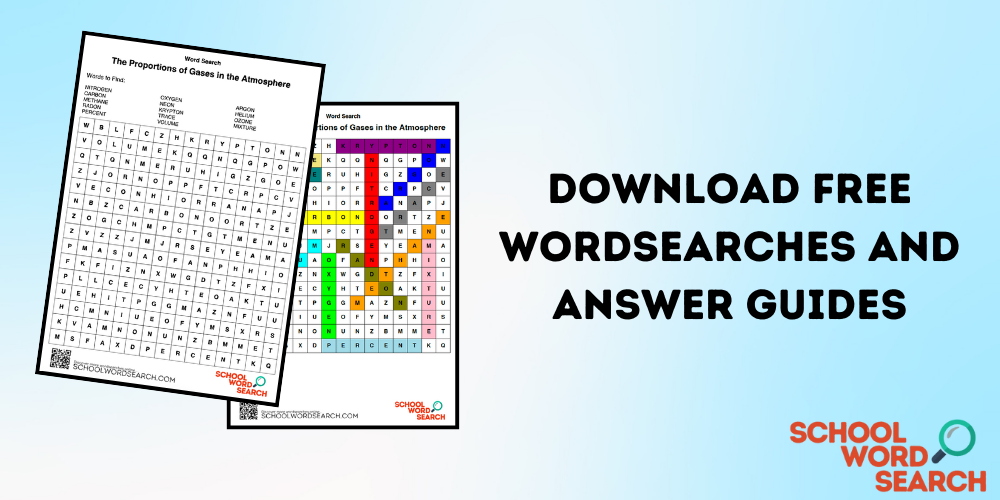Welcome to the GCSE Biology Wordsearches page! Here, you’ll find a variety of engaging and educational wordsearch puzzles designed to help students reinforce their vocabulary and understanding of key concepts within Biology! Here, you can find links to all wordsearches and an option to search for a wordsearch if you know the topic by name
Why Use our GCSE Wordsearches?
Reinforce Learning: Our wordsearches are an excellent way for students to review and retain important terms and concepts from their Biology studies.
Engage Students: Wordsearches offer a fun and interactive method for learning, making it easier to capture students’ interest and keep them engaged.
Flexible Use: These puzzles can be used in the classroom as part of your lesson plans, for homework assignments, or as additional practice at home.
Aligned with Curriculum: Each wordsearch is carefully crafted to align with educational standards, ensuring they support your teaching objectives.
How to Use This Page
Browse the Collection: Scroll through our list of GCSE Biology wordsearches. Each puzzle covers different topics within GCSE Biology, providing a comprehensive resource for your needs.
Download and Print: Click on the wordsearch title that interests you to download a high-quality PDF version. All our wordsearches are free and easy to print.
Incorporate into Lessons: Use these wordsearches to supplement your teaching materials, reinforce key terms, and provide students with an enjoyable learning activity.
All GCSE Biology wordsearches
GCSE Biology – Cell Biology
GCSE Biology – Cell Structure
GCSE Biology – Eukaryotes and Prokaryotes
GCSE Biology – Animal and Plant Cells
GCSE Biology – Cell Specialisation
GCSE Biology – Cell Differentiation
GCSE Biology – Microscopy
GCSE Biology – Culturing Microorganisms
GCSE Biology – Cell Division
GCSE Biology – Chromosomes
GCSE Biology – Mitosis and the Cell Cycle
GCSE Biology – Stem Cells
GCSE Biology – Transport in Cells
GCSE Biology – Diffusion
GCSE Biology – Osmosis
GCSE Biology – Active Transport
GCSE Biology – Principles of Organisation
GCSE Biology – Animal Tissues, Organs and Organ Systems
GCSE Biology – The Human Digestive System
GCSE Biology – The Heart and Blood Vessels
GCSE Biology – Blood
GCSE Biology – Coronary Heart Disease
GCSE Biology – Health Issues
GCSE Biology – The Effect of Lifestyle Non-Communicable Disease
GCSE Biology – Cancer
GCSE Biology – Plant Tissues, Organs and Systems
GCSE Biology – Plant Tissues
GCSE Biology – Plant Organ System
GCSE Biology – Infection and Response
GCSE Biology – Communicable Diseases
GCSE Biology – Viral Diseases
GCSE Biology – Bacterial Diseases
GCSE Biology – Fungal Diseases
GCSE Biology – Protist Diseases
GCSE Biology – Human Defence Systems
GCSE Biology – Vaccination
GCSE Biology – Antibiotics and Painkillers
GCSE Biology – Discovery and Development of Drugs
GCSE Biology – Monoclonal Antibodies
GCSE Biology – Producing Monoclonal Antibodies
GCSE Biology – Uses of Monoclonal Antibodies
GCSE Biology – Plant Disease
GCSE Biology – Detection and Identification of Plant Diseases
GCSE Biology – Plant Defence Responses
GCSE Biology – Bioenergetics
GCSE Biology – Photosynthesis
GCSE Biology – Rate of Photosynthesis
GCSE Biology – Uses of Glucose from Photosynthesis
GCSE Biology – Respiration
GCSE Biology – Aerobic and Anaerobic Respiration
GCSE Biology – Response to Exercise
GCSE Biology – Metabolism
GCSE Biology – Homeostasis and Response
GCSE Biology – The Human Nervous System
GCSE Biology – Reflex Actions
GCSE Biology – The Endocrine System
GCSE Biology – Control of Blood Glucose Concentration
GCSE Biology – Maintaining Water and Nitrogen Balance in the Body
GCSE Biology – Hormones in Human Reproduction
GCSE Biology – Contraception
GCSE Biology – The Use of Hormones to Treat Infertility
GCSE Biology – Negative Feedback
GCSE Biology – Plant Hormones
GCSE Biology – Inheritance, Variation, and Evolution
GCSE Biology – Sexual and Asexual Reproduction
GCSE Biology – Meiosis
GCSE Biology – DNA and the Genome
GCSE Biology – Genetic Inheritance
GCSE Biology – Inherited Disorders
GCSE Biology – Sex Determination
GCSE Biology – Variation
GCSE Biology – Evolution
GCSE Biology – Selective Breeding
GCSE Biology – Genetic Engineering
GCSE Biology – Cloning
GCSE Biology – Theory of Evolution
GCSE Biology – Speciation
GCSE Biology – Understanding of Genetics
GCSE Biology – Evidence for Evolution
GCSE Biology – Fossils and Extinction
GCSE Biology – Resistant Bacteria
GCSE Biology – Classification of Living Organisms
GCSE Biology – Ecology
GCSE Biology – Communities
GCSE Biology – Abiotic and Biotic Factors
GCSE Biology – Adaptations
GCSE Biology – Levels of Organisation
GCSE Biology – Organisms in Their Environment
GCSE Biology – Competition in Animals
GCSE Biology – Competition in Plants
GCSE Biology – Feeding Relationships
GCSE Biology – Biodiversity
GCSE Biology – Waste Management
GCSE Biology – Land Use
GCSE Biology – Deforestation and Global Warming
GCSE Biology – Trophic Levels in an Ecosystem
GCSE Biology – Pyramids of Biomass
GCSE Biology – Transfers of Biomass
GCSE Biology – Factors Affecting Food Security
GCSE Biology – Making Food Production Efficient
GCSE Biology – Sustainable Fisheries
GCSE Biology – Role of Biotechnology
GCSE Biology – The Effect of Human Interaction on Ecosystems
